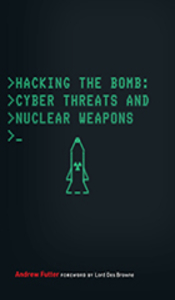Hacking the Bomb: Cyber Threats and Nuclear Weapons


“Hacking the Bomb: Cyber Threats and Nuclear Weapons”
Speaker: Futter, A. (University of Leicester)
Date: 29 November 2018
Speaker Session Preview
SMA hosted a speaker session presented by Dr. Andrew Futter (University of Leicester) as a part of its SMA STRATCOM Academic Alliance Speaker Series. During his presentation, Dr. Futter highlighted his research on cyber threats and nuclear weapons. First, he introduced the cyber-nuclear nexus, and explained his motivation for conducting this research, while outlining a series of questions he asked himself while writing his book. He proceeded to discuss 11 things that one should know about cyber threats and their relationship with nuclear weapons: 1) Cyber is a contested concept; 2) Cyber and nuclear are different; 3) Some cyber challenges are inherent; 4) Cyber threats are diverse; 5) Air gapping is not a panacea; 6) Espionage and IP theft are the biggest cyber threats; 7) Deterrence can play a role in the cyber-nuclear realm, but it has to be nuanced; 8) Viewing cyber as “separate” is unhelpful; 9) Cyber threats are most dangerous in a crisis; 10) Humans are an absolutely fundamental part of the cyber challenge; and 11) There seems to be an emerging norm of “hacking the bomb.” To conclude, Dr. Futter offered a series of recommendations, including that the US keep its nuclear facilities simple, separate, and secure.
Dr. Andrew Futter is Associate Professor of International Politics and Director of Research for Politics and International Relations at the University of Leicester, UK. His research focuses on nuclear issues and the impact of technology on warfare and strategy.
He is the author of five books: Ballistic Missile Defence and US National Security Policy; The Politics of Nuclear Weapons; Reassessing the Revolution in Military Affairs; The United Kingdom and the Future of Nuclear Weapons; and Hacking the Bomb, which explores the intersection of cyber threats and nuclear security.
Dr. Futter has served as a Visiting Fellow at the Nobel Peace Institute in Oslo and at the James Martin Center for Nonproliferation Studies in Monterey, California. He was also a member of the Cyber-Nuclear Threats Task Force run by the Nuclear Threat Initiative in Washington, D.C.
